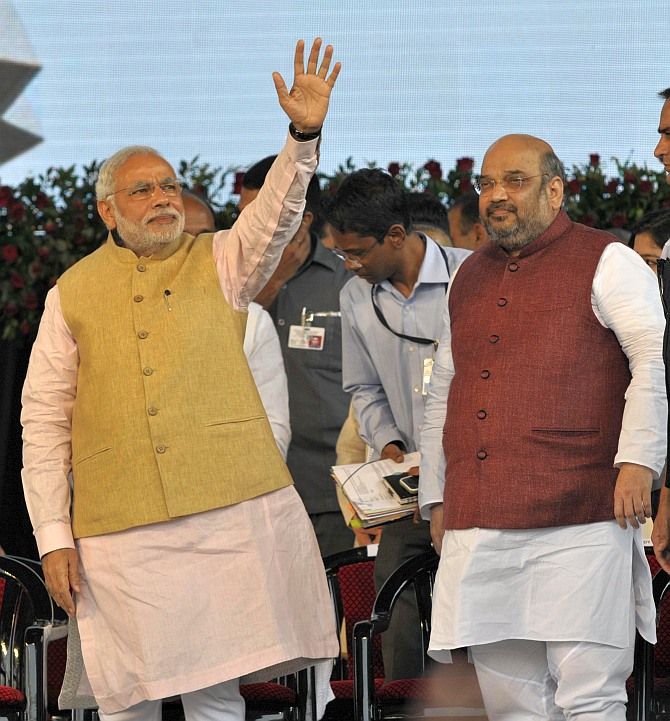 The BJP senior leadership is putting together a case for Amit Shah's continuance as party president despite the humiliating defeat in the Bihar assembly election, reports Aditi Phadnis.
The BJP senior leadership is putting together a case for Amit Shah's continuance as party president despite the humiliating defeat in the Bihar assembly election, reports Aditi Phadnis.
It seems unlikely now that the Bharatiya Janata Party will take the advice of the older members of the party and change anything in the way it works.
The senior leadership is putting together a case for the continuance of Amit Shah as party president despite the humiliating defeat in the Bihar assembly elections. The BJP constitution says the president of the party as well as the state and district unit chiefs can get a second term, each term being of three years.
Shah took over from Rajnath Singh in July 2014 after the latter was made home minister in the Narendra Modi government. So technically he hasn't even completed his first full three-year term, what to say of the second.
If ordered by Modi, the BJP could agree that a party president should have at least three years in office from the day he took over.
Just as an aside, the BJP constitution seems to be, at least in recent years, based on the popular principle of 'Show me the face and I'll show you the constitution.'
The tampering with the constitution started a long time ago, but the most recent example was in 2012 when Singh moved a resolution to amend Article 21 of the party constitution, to give any eligible active member holding the post of president to hold a three-year term twice. The proposal was seconded by Venkaiah Naidu and the BJP's National Council approved the resolution unanimously.
Before that, in May 2012, the BJP National Executive, which met in Mumbai, passed a resolution to this effect. This change was meant to enable Nitin Gadkari, then party president, to get a second term.
Terrified that some margdarshak might emerge to show the party the way in the wake of the Lok Sabha defeat in 2009, the Rashtriya Swayamsevak Sangh got the party to change its constitution because it was felt that Gadkari was showing signs of reviving it.
However, that came to nought: Although everything was ready for a second term, some mysterious elements, presumably within the party, leaked reports of dubious investments through shell companies in Gadkari's business empire, the Purti chain.
The way a party leader tells it, everyone was told that Gadkari would be getting a second term, preparations for voting (because it is an electoral college comprising the National Council and state councils that elect the party president) were made -- and the night before voting was to take place, TV channels reported that Gadkari had decided to step down as president of the party.
Now it seems Shah is the beneficiary. Taking advantage of the three-year term clause, it is likely to be argued that the president who would have completed his term would have been Singh. Now that Singh has yielded in favour of Shah, the latter must get his own three years.
The question is, what happens to the margdarshaks.
All indications are that their 'rebellion' will be ignored. All of them were present at the cremation of Vishwa Hindu Parishad leader Ashok Singhal and they stood side by side with the very people whose conduct they had criticised. The feeling is: They have said what they needed to -- the matter is on the table. Now the party has to respond.
And it will. Those watching from the sidelines say the party president is trying to come to grips with the fact that Delhi is not Gujarat and 'he's not a man with a hammer in search of a nail.'
The party realises that Shah has a strategic purpose: To guard Modi's assets, whether it is the party, elections or individuals. If that is his purpose, it is logical that the odd electoral defeat will not lead to his sacking.
Besides, who hasn't lost elections? And it is not as if the BJP had held Bihar and then lost it. What they lost was an opportunity to hold a state.
The fact is the BJP as a party does not respond well to hectoring and bullying. The margdarshaks know this better than anyone else. But the party president would do well to remember this as well.











